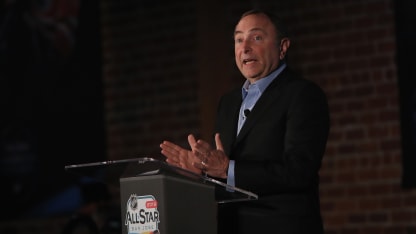"The discussions have been cordial and constructive, even though they're preliminary," NHL Commissioner Gary Bettman said. "We're not looking for a fight."
The current CBA, a 10-year agreement that was ratified in January 2013, expires after the 2021-22 season. But without an extension in place, each side would have to determine in September whether to trigger their respective reopener options, which then would cause the CBA to terminate in September 2020.
The NHL has lost games because of work stoppages prior to ratifying the past three CBAs, including losing the entire 2004-05 season and the first three months of the 2012-13 season.
"We've had a couple of meetings and we're exploring the possibility of whether we can bridge gaps early," NHL deputy commissioner Bill Daly said. "Earlier the better. We obviously understand the difficulties we've had in the past. I think both parties have acknowledged that. I think the fact that we're sitting down having constructive dialogue on open issues at an early date is very positive.
"I can't tell you where it will go. We're, as I said, in the very early stages of that process. But it's been a good process to this point."
Mathieu Schneider, the NHLPA's special assistant to the executive director, echoed that sentiment.
"In 2012, you could cut the tension with a knife when you were sitting in those first couple of meetings and in most meetings," he said, "and we're able to have these discussions now without that tension, without any walls being built up and it's been very positive so far."
Commissioner Bettman and Daly each said they feel the relationship between the League and the NHLPA is better now than it was during the previous round of collective bargaining.
"We're in a place in our relationship where we communicate very well, we have constructive and candid dialogue," Commissioner Bettman said. "The players financially as the League financially has never done better. Everybody is going to take a good hard look in terms of what's important and what they may or may not have to have. In a cold sober look at where we are, both the players and the owners are going to have to figure out what's important."
Daly added that the two sides now have the same goals in mind as well.
"I think there is a recognition on both sides that our interests are aligned," Daly said. "It's about growing the business, it's about growing the sport, it's about growing revenues in the sport. I think those things are important."
None of that can continue without labor peace, which Commissioner Bettman said should be the driving force in the next round of collective bargaining so a resolution can be reached before the risk of another work stoppage presents itself.
"I've always thought labor peace would be a really good thing, but there were certain things that we had to accomplish," Commissioner Bettman said. "Whether or not we've had disputes in the past, there's no question the League is healthier now, dramatically. We wouldn't be where we are today if we didn't have a system that corrected some of the ills of the past. We have stability, we have competitive balance and the game has been able to grow, and that's been for everybody's benefit who has been a part of the game. I don't just mean that financially, I mean that competitively and aesthetically, which has been great for the fans.
"Hopefully we're at a place where labor peace can be more important than anything else we need to accomplish, because I think the opportunities in front of us are even greater than what's been behind us."

